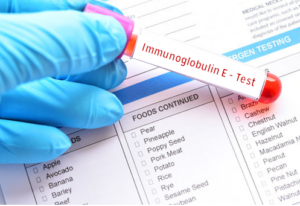Understanding the Benefits of IgE Testing in Allergy Assessment, Lab Services & The Significance of Negative Results
Claudia DeLara, MLS (ASCP)cm Technical Supervisor, Immunology
June 28, 2024
 Allergies, ranging from hay fever to food allergies, affect millions of people worldwide, impacting their quality of life and sometimes posing severe health risks. In the realm of allergy diagnosis, Immunoglobulin E (IgE) testing emerges as a pivotal tool, offering critical information into allergen sensitivities and guiding personalized treatment approaches.
Allergies, ranging from hay fever to food allergies, affect millions of people worldwide, impacting their quality of life and sometimes posing severe health risks. In the realm of allergy diagnosis, Immunoglobulin E (IgE) testing emerges as a pivotal tool, offering critical information into allergen sensitivities and guiding personalized treatment approaches.
Understanding IgE
Immunoglobulin E (IgE) serves as the immune system’s specialized defense mechanism against specific allergens encountered in the environment. When an individual with allergies encounters allergens such as pollen, pet dander, certain foods, or medications, their immune system mounts a response by producing IgE antibodies. These antibodies recognize and bind to the allergens, initiating a cascade of immune reactions. Upon subsequent exposure to the same allergen, the IgE antibodies trigger the activation of mast cells and basophils, two types of immune cells abundant in tissues throughout the body. This activation prompts the release of inflammatory substances, including histamine, prostaglandins, and leukotrienes, which contribute to the characteristic symptoms of allergic reactions, such as itching, swelling, sneezing, and wheezing.
Role of IgE Testing
IgE testing serves as a crucial diagnostic tool in the identification and management of allergies. By detecting the presence of specific IgE antibodies in the bloodstream, healthcare providers can pinpoint the allergens responsible for triggering allergic reactions in patients. Blood tests measure the amount of IgE antibodies directed against specific allergens, providing quantitative information about the degree of sensitization. On the other hand, skin prick tests involve introducing small amounts of allergen extracts onto the skin and observing for localized allergic reactions, such as redness and swelling. These tests help healthcare providers tailor treatment plans to address patients’ specific allergen sensitivities effectively. By identifying the precise allergens triggering allergic symptoms, IgE testing enables healthcare providers to recommend targeted interventions, such as allergen avoidance strategies, medications, or allergen immunotherapy. Moreover, IgE testing plays a pivotal role in monitoring patients’ responses to treatment over time, guiding adjustments to therapy as needed to optimize outcomes and enhance quality of life.
IgE Testing and the Lab
Laboratories equipped to conduct IgE testing provide healthcare providers with essential tools for accurately diagnosing allergic conditions, thereby guiding appropriate management strategies and improving patient outcomes. Labs offering IgE testing play a vital role in the diagnosis and management of allergic diseases. Utilizing advanced immunological techniques, these laboratories analyze blood samples to quantify the amount of allergen-specific immunoglobulin E (IgE). By accurately measuring IgE amounts, information is provided to healthcare providers to aide in identifying allergens triggering adverse immune responses in patients. Additionally, with the advent of comprehensive allergen panels and multiplex assays, modern IgE testing laboratories can assess reactivity to a wide array of allergens simultaneously, enhancing diagnostic efficiency and enabling a more thorough evaluation of allergic sensitivities.
Benefits of IgE Testing:
- Accurate Diagnosis: IgE testing provides a precise method for identifying allergens responsible for allergic symptoms. By pinpointing specific triggers, healthcare providers can offer targeted advice on allergen avoidance strategies and recommend appropriate treatments.
- Customized Treatment Plans: With information obtained from IgE testing, healthcare providers can develop personalized treatment plans tailored to each patient’s specific allergen sensitivities. This may include allergen avoidance, prescription medications, or allergen immunotherapy (such as allergy shots or sublingual tablets), aimed at desensitizing the immune system to specific allergens.
- Improved Quality of Life: By accurately identifying allergens and implementing effective management strategies, IgE testing can significantly improve the quality of life for allergy sufferers. Patients can experience reduced frequency and severity of allergic reactions.
- Prevention of Severe Reactions: For individuals with severe allergies, IgE testing can be lifesaving. Identifying allergens through testing enables patients and healthcare providers to take proactive measures to avoid exposure to triggers that could lead to severe allergic reactions, including anaphylaxis.
The Power of the Negative: Understanding the Value of Knowing What You are Not Allergic To
Emphasis is often placed on identifying allergens that trigger adverse reactions. However, there’s an equally valuable aspect to consider knowing what you’re not allergic to. This often-overlooked aspect, termed the “power of the negative,” is increasingly recognized for its clinical significance.
IgE testing plays a pivotal role in the diagnosis of allergic diseases, aiding clinicians in identifying allergens triggering adverse immune responses in patients. However, while positive results confirm the presence of specific IgE antibodies against particular allergens, negative results hold considerable diagnostic weight. A negative IgE test can effectively rule out the presence of IgE-mediated allergies, guiding healthcare providers away from unnecessary treatments or interventions. By excluding IgE-mediated allergies, clinicians are prompted to explore alternative etiologies such as non-immunological triggers or other immune pathways, leading to a more comprehensive understanding of the patient’s condition. The power of the negative in IgE testing extends beyond mere absence of specific antibodies, serving as a valuable tool in optimizing patient care pathways and promoting personalized management strategies for allergic diseases.
IgE testing serves as a cornerstone in the diagnosis and management of allergies, offering invaluable insights into allergen sensitivities and guiding personalized treatment approaches. By accurately identifying allergens and tailoring treatment plans accordingly, IgE testing empowers healthcare providers to improve patient outcomes, enhance quality of life, and mitigate the risks associated with severe allergic reactions. As our understanding of allergies continues to evolve, IgE testing remains a vital tool in the diagnosis and management of allergic diseases.